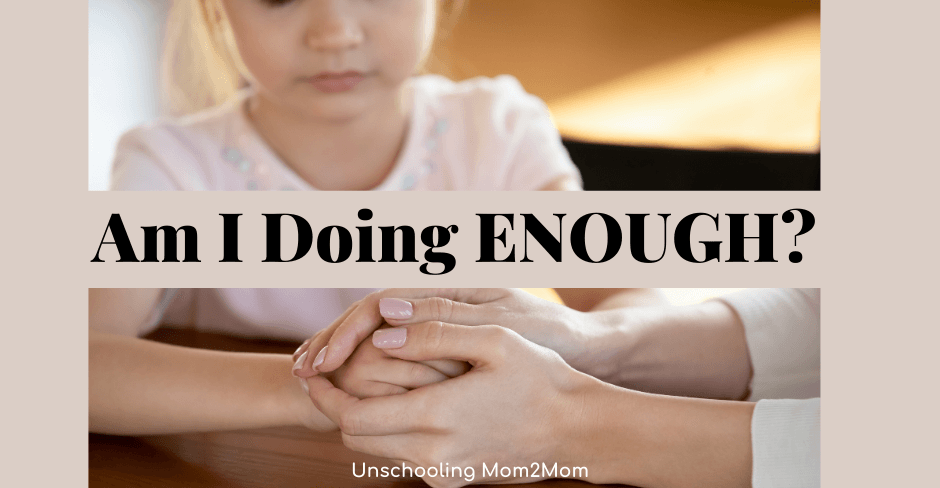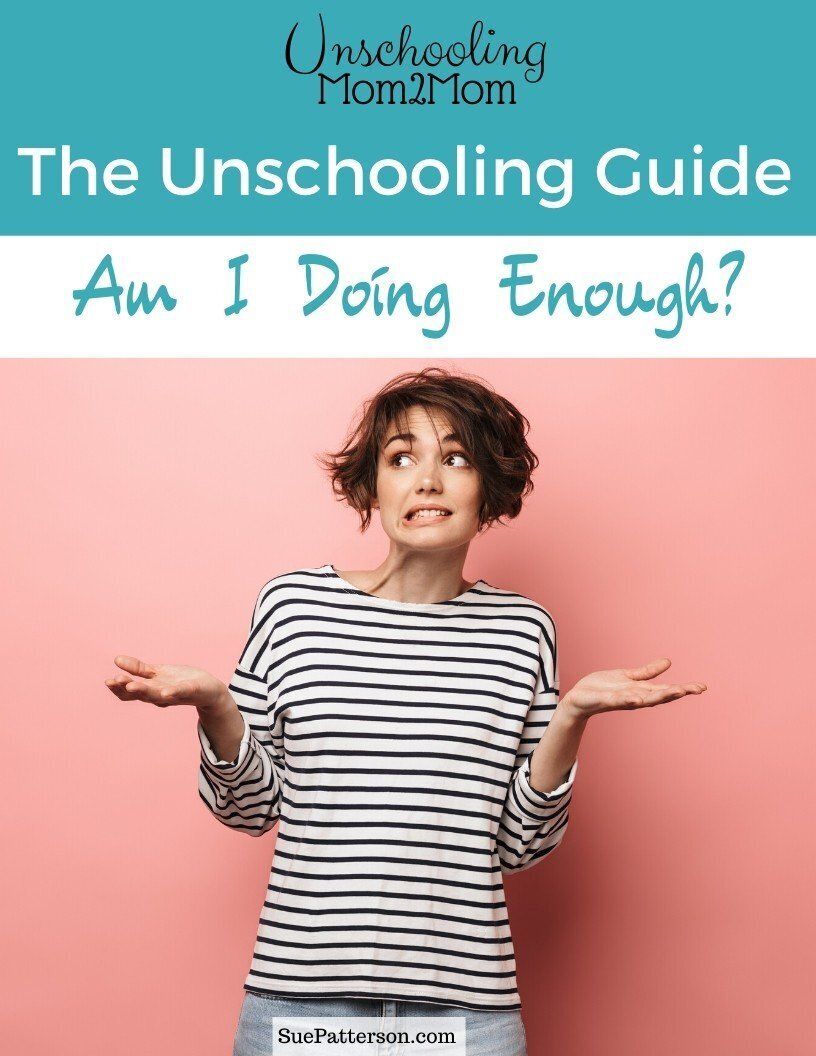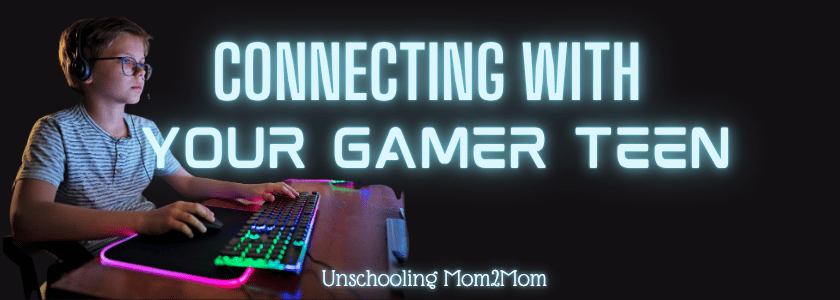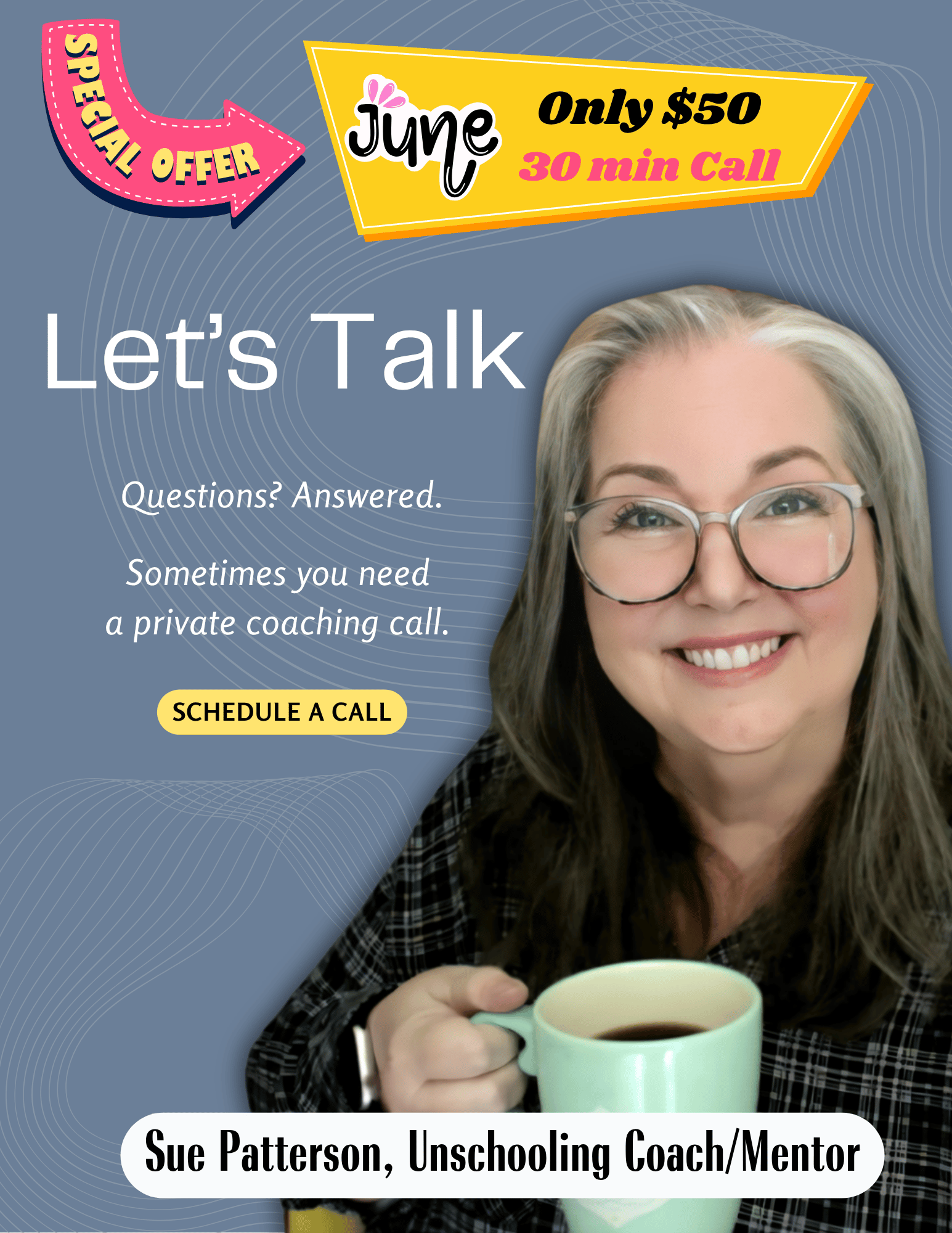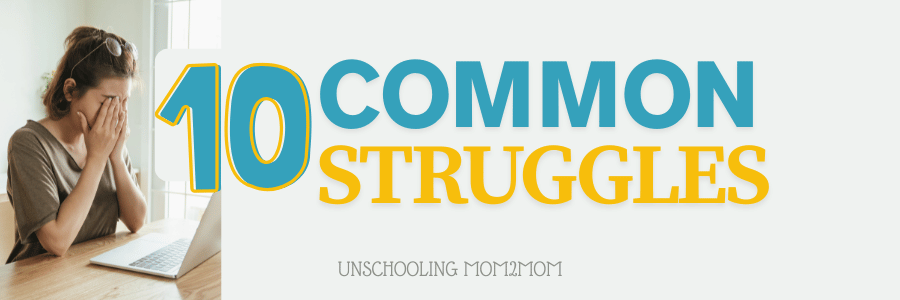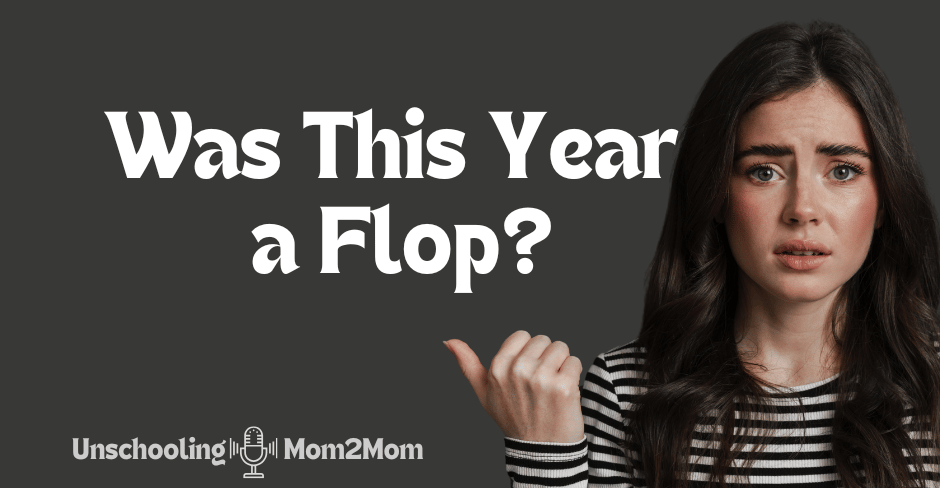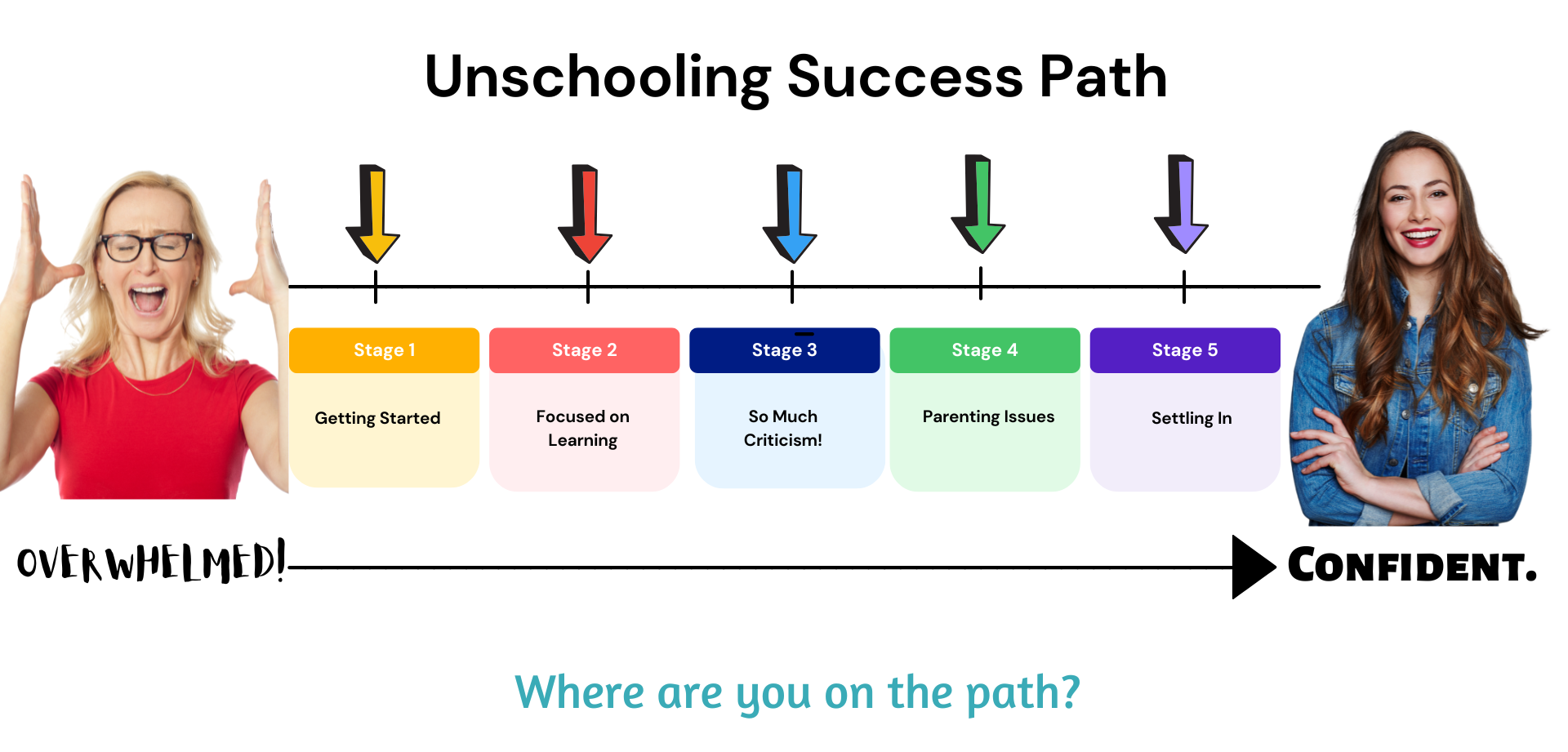“Am I Doing ENOUGH?”
When people begin to homeschool in a less-traditional way, they often worry if they are doing enough, providing enough, educating enough. Good parents worry about that all the time – in non-academic ways too:
"Are we connecting enough?"
Let’s face it, it would be a lot easier to follow a curriculum or just do what the teacher told you to do. But now you’re aspiring for more than that kind of mindless following. While you recognize that the one-size-fits-all approach doesn’t work for you, that does put a significant amount of responsibility on your shoulders. And that often leads to feeling pressure.
Sometimes we worry about whether we’re doing enough because we have been told so many times about the importance of “Structure!” So when we are stepping off the predesigned conventional path, it feels loose and lacking in purpose.
Yes, it’s loose - in that the new structure is more flexible and fluid. We won’t need to get approval from some powers-that-be to make adjustments to our day! We are taking our cues from the here and now! And that may mean... it’s too gorgeous of a day to stay inside, or maybe one of the kids isn’t feeling so great, so staying home is exactly what needs to happen. It’s totally YOUR call.
But it’s not lacking in purpose!
It’s just that the purpose has changed.
The goals are different - but they aren’t non-existent.
Far from it!
Unschooling goals have more to do with understanding that learning comes when the learner is engaged. And the best way for that to happen is to see what they’re curious about and help them learn more about it.
Another goal is to strengthen the parent-child connection. And this is done over time with trust that learning is happening (without major orchestrations from us!) and with respect for what our children are valuing.
Creating this partnership is a deliberate goal in unschooling.
ARE YOU Doing Enough?
Let's stop all this second-guessing!!
Families may be concerned about educational activities, if their child has enough opportunities to explore and discover, or how the days are progressing. Parents waste a lot of time second-guessing themselves!
This 25-page full-color Unschooling Guide will help you figure out if you're doing fine - or if you may need change things up a bit. Here are a few of the topics and how we'll walk you through this question:
• Why You May Think This Way
• Changes You Could Make in Your Home
• What About Your Community?
• About Structure
• Practical Tips
•What Are Your Priorities?
•How to Live a Good Life
•Journal Prompts
•Worksheets for Keeping Track
•Inspiration: Quotes & Memes
A Bit About Learning
One of the major differences between how unschooled kids learn and how schools teach has to do with context and relevance.
Unschooled kids learn something because they want to know it - or they need to know it so they can do something they want to do. It's relevant to their life and it's in a contextual framework that makes sense to them.
Schools, on the other hand, operate as if a giant collection of random facts need to be memorized in case some day, you may need them. Because it's all disconnected from what's real in their lives, these pieces of information aren't easily stored. There's nothing to hook them to, no relevance, no context. That's why, as children, we could memorize for the test on Friday, but then not be able to recall the material a month later. (Sounds familiar, right?)
You can read more about this:
And if that's not enough reason to ditch this method of teaching/learning, the technological reality of living in this day and age, is that random facts are easily searchable through whatever technology is at our fingertips. Gone are the days where we have to race over to the library before it closed or head home to look up something in an encyclopedia (that was often outdated.) Now, reaching into our pocket for our phones gives us handy access to more information than we ever could EVER have memorized.
One problem of school is that all that knowledge is so disconnected from the kids’ lives. When kids can see the importance of various topics - because they’re interacting with the topic right in the here and now - they’re going to see the need to know it. They’re actually developing their own unique body of knowledge. And it will be exactly what they need, in order to make their next steps. One step leads to another.
Unschooled children end up learning math and history and science because they're naturally curious about the world they live in. Casual conversations can introduce all kinds of random (and yet relevant in the moment) opportunities to know more about the world.
Sometimes the learning will often be the byproduct or almost a side effect of their goal. Maybe it’s something they need to learn so they can do the thing they want to do.
Often, it doesn’t look like school subjects - and parents may not even notice it's happening!
- History will look like stories of interesting people and events from the past.
- Language arts shows up as they play pretend and work on story and character development. Chatting online or reading directions develops their vocabulary.
- Science will be discovery, and questions, and testing theories. Every time they do that, they’re using the scientific method!
- Math will be the way to solve the problems that present themselves each day. It will be games, in art, in architectural patterns - or estimating how long it will take to for the grocery shopping, or budgets - so many ways exist for math to intertwine throughout our daily activities.
So when we're worried about "doing enough," it's very likely we're just not looking in the right direction. We're looking for schoolish subjects and familiar hoops to jump through - instead of the real life learning that's happening all around us.
Priorities
So, lots of parents still ask,
“Ok what DO you prioritize?”
Connection/relationships and fueling curiosities come to mind first for many unschooling parents. But maybe you have other ideas too - and I’m sure the kids do too!
It might help to create a list to help focus on what your kids might need before they move into adulthood. Not a scope and sequence of facts to know (their phone has whatever they might need for that!) Instead, it’s focusing more on what makes up a "good life." And remember, that's going to be unique to every person. And why this unschooling thing is such a personal journey.
Different Priorities:
- Kindness and compassion.
- Listening to people when they talk.
- Stress Management.
- Learning about how easy it is to be manipulated by marketing.
- What it means to be brave in every day choices.
I have more, but what else would you include in YOUR list?
You might not prioritize the same things I have!
But talk about this kind of list with your kids. What would they want to add/remove?
Sometimes when we’re thinking about something, we see opportunities in our path for conversations about the topic. This may help you too.
Asking yourself if you’re “doing enough” can be a sign of being a good parent. We all worry about that from time to time. But it’s rooted in fear. And that’s something we can shift.
Maybe it’s about reframing and learning more about how unschooling actually works. Our own learning to trust the process takes a little time and it’s not a passive thing someone can do FOR us. That’s why I always recommend that you gather the information and support that you need to do this kind of reframing in your own head. You have personal baggage to work through.
But it’s worth it.
Just keep reminding yourself that a more joyful life, more connection with the kids, less fear-based decisions - that’s what’s on the other side of all this personal work. Kids learn what they need to learn, when they need to learn it.
Hopefully this helps with that age-old question, “Am I Doing Enough?”
Remember...
Information + Support = Unschooling Success.
So that’s it for this time! Enjoy your family and I’ll talk with you again next week!
Tap into the unschooling resources available to you!
I can help!
Unschooling Guides
Downloadable PDFs to help
with specific concerns
Membership Group
When you need coaching and community to make these changes!
Unschooling 101
Practical steps and a strategy
to help you get started Unschooling!


